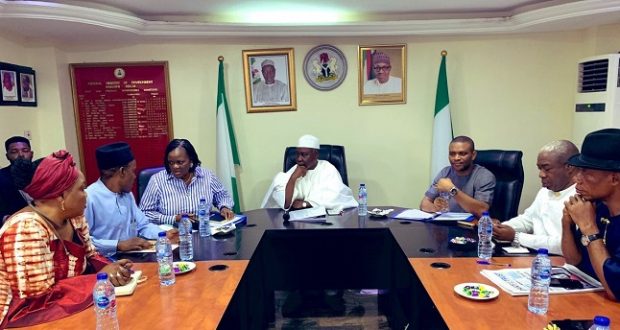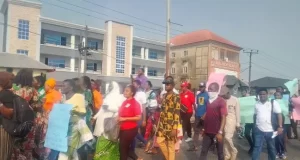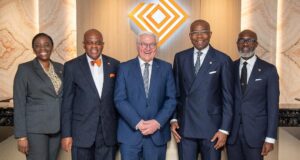A legislative oversight appears to have exposed cracks in the operations of the Hydrocarbon Pollution Remediation Project (HYPREP), a body established by the Federal Ministry of Environment to implement the United Nations Environment Programme (UNEP) Report on Ogoniland and oversee the clean up of the polluted region.
Amid complaints by the Environmental Rights Action/Friends of the Earth Nigeria (ERA/FoEN) that the Ogoni clean-up process was veering off course and needed legislative intervention to halt the drift as well as save the country from wasting billions of naira, members of the Senate Committee on Ecology and Climate Change, and House of Representatives Committee on Climate Change met with HYPREP officials in the presence of ERA/FoEN on Wednesday, September 9, 2020 in Port Harcourt, Rivers State.
Project Coordinator of HYPREP, Dr Marvin Dekil, in the company of his assistants, faced a barrage of probing questions from the Joint Committee members, who sought to clarify grey areas related to the functions of HYPREP and the multi-million-dollar, much-talked-about remedial initiative.
Highlight of the enquiry was when a member of the House of Representatives, Benjamin Okezie Kalu, expressed concern over a UNEP report entitled “Preliminary assessment of HYPREP approved laboratories” of September 2019 that showed that none of the laboratories approved for use by HYPREP had the required accreditation.
Indeed, UNEP had concluded that “the quality and reliability of the results produced from these laboratories were questionable”.
Kalu, therefore, questioned the authenticity of remediation site results if UNEP impliedly casted an aspersion to such.
But Dekil stood his ground, saying that the laboratories were approved by the National Oil Spill Detection and Response Agency (NOSDRA) and that HYPREP was simply a “user of the laboratories”.
He said: “You are accusing me of using the services of an organisation approved by a constitutionally recognised body, and an external person tells me that that is not correct. I am a user. I am not saying that the labs are bad.
“I have used both internal and external labs before and for every sample sent to an international lab, I got four different results; same for when I sent those samples to labs in Nigeria. We should not allow international organisations to come here and discredit our work. I am therefore faulting that UNEP report that says that results from our approved labs are unreliable.”
Okezie, however, replied him, saying: “This is not about statements and speeches, but about your commitment to the Ogoni people. If there is any aspersion cast on the integrity of any lab, it is your responsibility as the coordinator to seek to know why, wherever you take that same result. You can go the extra mile for the interest of the Ogoni people to say, yes, granted that the Federal Government has approved NOSDRA to accredit the lab and someone is questioning the integrity of the result produced, I owe Ogoni people this particular commitment to take it to another lab to check whether the assertion of UNEP is true or not.
“If you do a comparative analysis of about three labs and then confirm what NOSDRA has done, then you can stand and speak the way you are speaking. But if you have not done that comparative analysis, I do not think you can justify rejecting the UNEP report.”
Okezie also demanded a Monitoring and Evaluation (M&E) plan, which he describes as “a compendium of how you monitor all the sites”. HYPREP was however unable to produce any, prompting him to order the organisation to immediately prepare one and send to the National Assembly in Abuja.
Another member of the House of Representatives, Princess Miriam Onuoha, demanded for a certified audited financial report of HYPREP. She underlined the need for publication of a financial report.
Onuoha made the inquiry in the light of the fact that the Ogoni Trust Fund received $10 million in 2017 and further amounts in 2018 and 2019 totaling $36o million, while HYPREP has so far reportedly accessed $38.5 million.
“The Ogoniland clean-up is an internationally acclaimed project that has a lot to do with transparency and accountability, which is expressed via the preparation of certified audited report,” she said.
Along with Senator Ibrahim Abdullahi Danbaba, Princess Onuoha questioned the conversion of received funds from US Dollars to the Nigerian Naira and the conversion rates applicable.
HYPREP’s detailed summary of funds released showed that, at the exchange rate of N305.82004 to $1, $10 million brought in the equivalent of N2,720,400,200.00.
Dekil replied, saying that the HYPREP Board of Trustees, which deals the organisation’s money, does the conversion, and not the management team. He added that every contract is award in Nigerian Naira.
On the number of unhealthy people treated/tracked by HYPREP, Dekil disclosed that the organisation re-engaged UNEP to carry out technical support in that regard.
“One of such is to drive the framework to implement the health study. The statement that people are dying is only an allegation. The study was supposed to confirm these claims. This is something that UNEP is currently helping us to put together. We want to build something that when we publish it, nobody will be able to challenge it.”
On the quality of contractors and the seeming slow pace of work on site, Dekil said he was unhappy with the work pace, and that he makes out time to monitor work on site.
He said: “The contractors must show competence. I personally go to the sites, I interview the project managers. Every contractor has a timeline, but some timelines may not be met because of community-related issues and inability to gain access to the site.
“Some sites were flooded for months, and I could not fault the contractors for that as they were unable to commence work. In Lots 13 and 14, there were issues there and contractors could not go to site because of the change of guard of the community.”
Questioned about the state of HYPREP’s relationship with host communities and civil society organization, Dekil said that the organization civil society is represented on its Board of Trustees and Governing Council.
But Dr Godwin Uyi Ojo of ERA/FoEN countered the claim, saying that HYPREP’s civil society consultation was “not broad-based”, and “not representative enough”.
The ERA/FoEN chief, who observed that contractors procured for the clean-up exercise lacked the capacity to achieve the objective, said that key deliverables in critical areas, such as transparency, accountability and local participation, had not been clearly articulated let alone achieved.
He, therefore, urged the lawmakers to adopt the HYPREP gazette and rework it with appropriate modification and pass it into law to provide backing with independent status
 Financial Energy Review
Financial Energy Review





